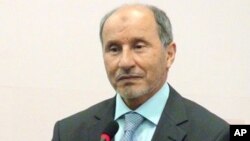Rebels in eastern Libya are welcoming the International Criminal Court's decision to issue an arrest warrant for leader Moammar Gadhafi, his son and his intelligence chief. Most people in the rebels' de facto capital were already convinced of his guilt.
In the east of the country, the news was greeted by waving the rebel flag and firing off celebratory rounds of ammunition. The head of the rebels' Transitional National Council, Mustafa Abdel Jalil, said the warrants will further their efforts to end Gadhafi's more than 40-year rule.
Jalil said anyone who helps hide the Libyan leader will face legal action by a new government, and he appealed to those close to Gadhafi to realize now is the time to distance themselves from him.
The TNC chairman added that the three people cited by the international court are just the beginning of a list of those who should be called to account.
Ali Abdsalaam is among the many ordinary Libyans who want to see justice for the leader he calls a tyrant. A truck driver in his fifties, he fled with his family from Misrata in April for the relative safety of Benghazi. Now he and his two wives are trying to provide for their 10 children, the youngest born a week after the uprising began.
One of the daughters, Fariel, 12, recalls those weeks before the family left, which saw some of the worst fighting of the government's siege of her city.
She says she was "scared of everything, especially the shelling - there was a lot of shelling in Misrata."
Ali Abdsalaam says the intensity of the attacks on their residential neighborhood was such that he moved his family to the north of the city, where they stayed with relatives.
One day, they took a chance and made their way through the mortar and rocket strikes to the harbor. They were among the lucky, finding passage on a ship ferrying people out of the city.
For Abdsalaam's daughter Fatima, the shelling was not what bothered her most. At 18, she was old enough to follow the news and hear the stories of others in her neighborhood.
She says her biggest fear was that government troops would break into her home, kidnap the men and rape the women.
Rape was something rarely discussed in Libya before the conflict. But in recent months scores of women have come forward with claims of sexual attacks by government troops, leading human rights groups to believe Gadhafi forces are using rape as a weapon of war.
For the Abdsalaam family, those fears are gone for now. Camped out in a small apartment in Benghazi - stacks of mattresses line the walls of the main room - they try to imagine their future out from under the control of Gadhafi.
But the misery of life back in their home town is never far away. Earlier in the day the family was watching an opposition television report on the victims of recent shelling in Misrata. The image of a little girl appeared on the screen. It was their three-year-old cousin, being treated for a fractured skull.
Eastern Libyans Welcome ICC Charges Against Gadhafi




